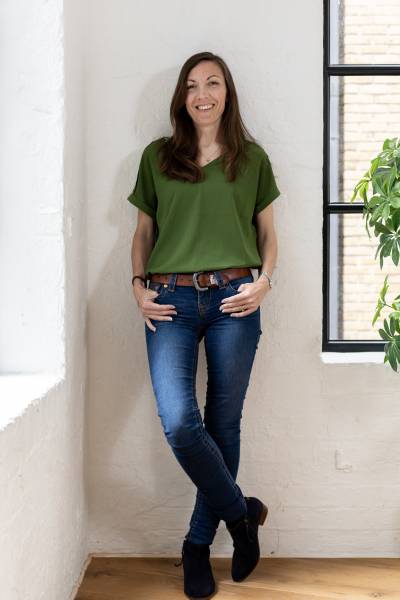- Did you enjoy school?
On the whole, I enjoyed school, but I’d be looking through rose tinted glasses if I said it was always enjoyable. I was relatively strong academically, but it was a high-performing school, and I definitely put more pressure on myself than I should have. Looking back, I wish the grown-up me could have had a little chat with the adolescent me. My advice for her would be to realise that in the long-term, results aren’t that important and despite what everyone is told in school – the decisions you make at that age don’t put you on a one-way path. You can change your mind. Managing stress is much more important and probably a more useful skill.

That said, I was lucky enough to have lots of opportunities and access to activities. So now, as a parent with children in secondary education, I definitely appreciate the education I received.
- What qualifications do you have?
I have a BA Hons in Dance with a minor in Geography. Pretty strange, I know, but I changed my mind about my career during my A-levels. I’d originally wanted to be a physiotherapist for dancers, but decided to just follow my passion and do a dance degree, with the idea that I would do a PGCE in secondary education afterwards. My family was mindful that I should also have a subject in the bank that didn’t rely on me being physically fit and I loved Geography, so I did that too. In the end, I didn’t enjoy the administrative side of teaching and found the politics behind the curriculum really frustrating, so I didn’t complete my PGCE.
- Has your career path been a smooth transition, a rocky road or a combination of both?
I think we can safely say it’s been a combination! I found the decisions in the early days hard and eventually just “got a job” while I worked out what I wanted to do, never thinking it would lead anywhere in particular. I worked for an IT recruitment firm and worked my way up through different positions, gaining experience and responsibility – and that is where I met my current bosses. I left that company after five years and had two years working elsewhere, but ultimately always regretted leaving. That was until I was approached to work for Mercator, at which point everything fell into place and I never looked back. That was in 2007 and here I still am, having helped to grow the company to a multi-million pound company with operations in the UK, Europe, the US and Singapore. 18-year-old me would never have dreamt that this is what I wanted to do – I just don’t think we understand ourselves at that age.
- What specific challenges do you see women facing in the industry?
It’s hard to always be outnumbered. I think you are more likely to have imposter syndrome if you don’t have someone similar to you working alongside you. I’ve been fortunate enough to have worked with some great people who have recognised the skills I have and rewarded me for them, so gender hasn’t come into it. That said, I am regularly outnumbered in meetings, and I can doubt myself, even if no one else is doubting me. I once read that it’s up to women to reach down and bring other women up to the higher levels of management and I think the more companies do to equalise things at the top, the easier the path will be for other women.
The other thing to realise is that it’s hard to have any kind of break with children. I have two children and took six months off (my choice) for each one. It’s amazing how much can change in a short period of time – you can really feel left behind! Again, I was very fortunate and was supported through those early years of constantly ill children that couldn’t go to nursery. I could also make nursery work financially – it isn’t possible for everyone, nor is it everyone’s preference and no one should be penalised for that, but the reality is you can be left behind. Strong family friendly policies and flexible work arrangements can help, but receiving support at ground level is what’s needed.
- What is the best career advice you can give to others?
Don’t be afraid to change your mind, and work hard. If something doesn’t fit and you’ve given it a good try, be prepared to try something new or shift sideways. You work more than you play, so it has to be a good fit. Work hard and be prepared to tackle things that you haven’t done before or that you might not see as “your job”. Obviously, you need to be mindful of boundaries, but you never know where side roads can lead.
- If you had to pick one mentor that had the biggest influence on you, who would it be?
Probably Mercator’s CEO, Marc Churchouse. He has always known just how far to push me and just how much to ask of me. He has always believed in me (sometimes I thought he was crazy) and gave me nudges when I’ve needed them. There are also times when I’ve given him a different perspective or I’ve challenged him – it’s a balance that seems to work.
If you liked this content…
- From where do you draw inspiration?
Mostly from the people I work with. We are all ingredients in a recipe – some have a stronger flavour than others, but even the subtle ones bring incredible skills to the cooking pot! I also take inspiration from my children. I find myself telling them to give something a try, to work it out, to work harder etc and then remember that I must do the same or else I’m not a very good example to them!
- What is the biggest challenge you have faced to date?
Probably like a lot of others, lockdown! Trying to do my job well while also filling the gaps left by teachers, friends and family for the children was tough. The reality is that it opened up a whole new world once it was finished – working from home when it suits, not needing childminders all the time or having to time all of your annual leave with the school holidays. I now have the ability to work absolutely anywhere, even my car if the need arises – pre-2020 that just wouldn’t have been possible.
- What qualities do you feel makes a good leader?
You need to be able to make decisions that give your team confidence in what they are doing. I am also a firm believer in being able to roll up your sleeves and help out if your team is busy. People need to feel like they can come to you with any query and they need to feel like they can make suggestions, so being open-minded is important.
- From a work viewpoint, what has the last 12 months been like?
Busy, but also liberating! We’ve increased our permanent staff base by about 40 percent, engaged in new government frameworks and made new partnerships in the private sector. I have been creating and leading the strategy for People and Organisation for Mercator, which is not something I have done before. I’ve faced a few challenges, but also learnt a few things about myself. If you put your mind to something and engage with the right people, you can nearly always achieve it…and where you don’t quite succeed, you always learn something.
- What would you say are the biggest tech-based challenges we face today?
I would say it’s knowing when technology is appropriate and when it isn’t. We have to remember that technology should make life easier and provide us with meaningful data. If systems aren’t carefully thought through they get clunky and the workload increases. It’s really easy to assume we need technology for everything, but there are some things that are better suited to humans. Just because technology can do it, doesn’t mean it should.
- What can be done to encourage more women into the industry?
I think it starts in school. We need to break down the connotations that the word “tech” has and probably take a good look at what is taught as part of the curriculum. There are so many careers in tech that cover a broad array of skills – I just don’t think they are talked about enough. If you educate on the diversity of careers you will attract a more diverse workforce. Beyond schools, bootcamps and academies are a useful way of attracting people into tech, and working with female-centric VCSEs is a great way of reaching a diverse range of women. It’s really important to tell our stories; so many of my colleagues haven’t entered the tech industry in a conventional way. Their career paths are fascinating and so relatable.
- Give us a fact about you that most other people wouldn’t know.
In the first few years of working at Mercator, I combined it with teaching for a dance company. I taught adults in the evenings and ran children’s dance parties on the weekends. We also ran a corporate dance workshop for employees at American Express. They were split into teams and I taught my troupe a dance to Yeah! by Usher. We then judged all the teams in a Strictly Come Dancing fashion. Seven!







